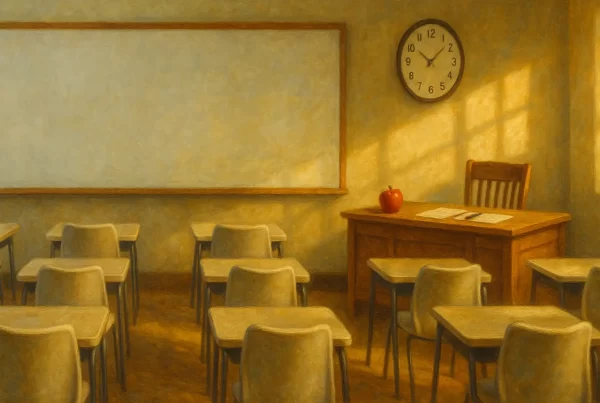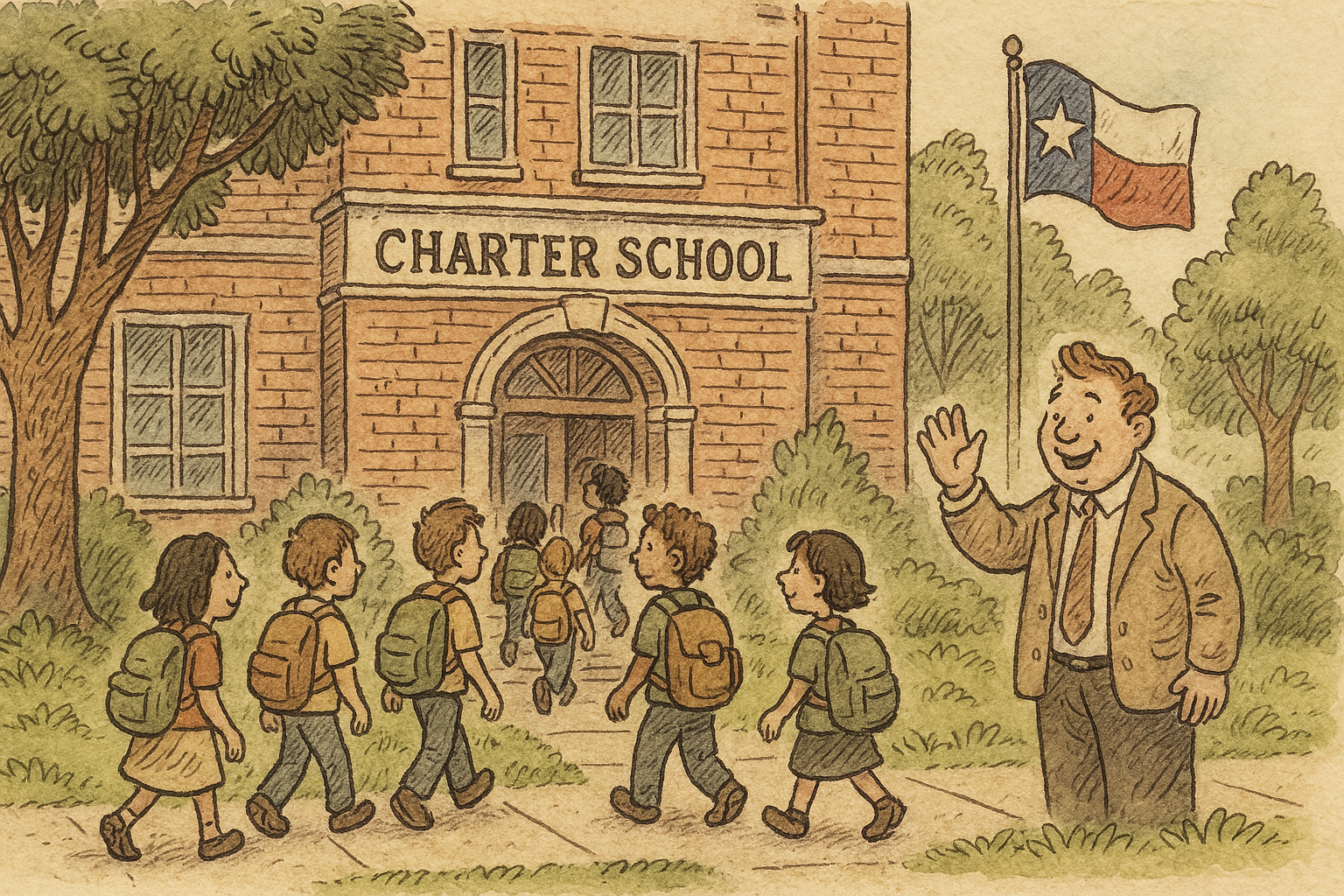Minimum Legal Standard
Private schools in Texas operate with substantial autonomy under a legal framework that imposes only limited state oversight.
Unlike public schools, which are governed by the Texas Education Agency (TEA) and must follow the Texas Essential Knowledge and Skills (TEKS) curriculum, private schools are not subject to comprehensive regulation. They are instead bound by a narrower set of statutory requirements, primarily relating to basic instruction, health and safety, and compulsory attendance.
Under Texas law, a private school must offer a “bona fide” educational program that includes instruction in reading, spelling, grammar, mathematics, and good citizenship.1 This “bona fide” standard—established through both statutory language and judicial interpretation—forms the foundation of the state’s regulatory posture toward private education.
In the landmark case Texas Education Agency v. Leeper in 1994, the Texas Supreme Court held that private and home schools are exempt from compulsory public school attendance laws so long as they provide genuine instruction in basic subjects.2 The Court emphasized that the state does not have authority to impose detailed oversight of curriculum or instruction methods beyond confirming that education is being provided in good faith.
Importantly, the Court also clarified what does not qualify as “bona fide” education: a sham operation, nominal or symbolic compliance, or programs that lack structure and consistency. For example, a household claiming to be a school but providing no regular instruction, no curriculum, or merely symbolic gestures toward education would not meet the legal threshold. The standard requires that instruction be real, substantive, and directed toward educating the child, even if informal or individualized.
This limited but meaningful definition preserves institutional and parental autonomy while ensuring that children enrolled in private or home schools are not wholly deprived of educational opportunity. Compared to states like New York, Massachusetts, and Pennsylvania, which impose mandatory teacher certification, curriculum review, and regular state inspections, Texas offers considerably more latitude to private schools. This reflects a political and legal culture that favors limited government and emphasizes parental rights in educational decision-making.
Licensing and Accreditation
Texas does not require private schools to be licensed, registered, or formally recognized by the state. There is no approval process through the Texas Education Agency (TEA), and schools may legally operate without any form of state certification or government-issued credential.
Instead, Texas allows private schools to function independently, subject only to the basic requirement that they provide a bona fide education in the core subjects of reading, spelling, grammar, mathematics, and good citizenship.3
Accreditation is entirely voluntary. Schools that wish to demonstrate instructional quality and operational integrity may seek accreditation through agencies recognized by the Texas Private School Accreditation Commission (TEPSAC). Accreditation can offer benefits such as greater credibility, eligibility for certain student programs, and smoother student transfers. However, unaccredited private schools are still legal and fully recognized under Texas law, so long as they meet the basic educational requirement.
Teacher Certification and Employment Practices
The state does not require teachers at private schools to hold Texas teaching certificates. This allows private schools to hire instructors based on their own criteria, often favoring subject-matter expertise or religious affiliation over formal certification. Accredited schools may impose additional hiring standards internally, but this remains a matter of institutional policy rather than state mandate.
Schools must, however, comply with general state laws related to employment and reporting of educator abuse in some circumstances.
Health and Safety Compliance
Historically, private schools in Texas have been required to comply with a range of public health regulations, including mandatory immunizations and screenings for vision, hearing, and spinal abnormalities.4 These requirements, enforced by the Texas Department of State Health Services (DSHS), apply broadly to all educational institutions, public and private alike.
However, in recent years the Texas Legislature has expanded the grounds for exemption from immunization requirements. Parents may now claim exemptions for medical reasons or for reasons of conscience, including religious beliefs, by submitting an official affidavit obtained through DSHS.5 These exemptions must be renewed every two years, and students with exemptions may be excluded from school during a declared outbreak or emergency.
While public schools must accept valid affidavits for exemptions, private schools—especially those that do not receive state funding—are not obligated to do so. A 2006 opinion from the Texas Attorney General affirmed that private schools have discretion in setting their own immunization policies and may reject students who present conscience-based exemptions.6 For example, Catholic schools in Texas may require full immunization compliance as a condition of enrollment.
In practice, enforcement varies widely. Some private schools adhere strictly to DSHS guidelines and verify immunization records diligently, while others take a looser approach or do not enforce documentation at all. The result is a decentralized system in which immunization standards are shaped more by institutional policy than by uniform state oversight.
Additionally, private schools must maintain fire safety and emergency preparedness standards under local fire codes, and are generally expected to operate in compliance with municipal zoning and occupancy rules.
Compulsory Attendance and Recordkeeping
Texas law requires children between the ages of 6 and 19 to attend school—public, private, or home-based.7 For families who choose private schooling, this requirement is met as long as the institution provides a “bona fide” education that includes instruction in reading, spelling, grammar, mathematics, and good citizenship.8 Private schools are not required to report daily attendance to the Texas Education Agency, but they must maintain internal records sufficient to demonstrate compliance if questioned by local authorities.
In practice, Texas offers broad latitude to parents in fulfilling the compulsory education requirement. Private schools operate without state inspection or direct oversight, and there is no centralized mechanism for verifying whether private institutions are meeting instructional standards beyond the minimal statutory baseline. As long as the school’s operations are not deemed fraudulent or abusive, state authorities are unlikely to intervene.
This permissive approach is even more pronounced in the case of homeschooling. Under Texas law, homeschools are legally considered a form of private school and are exempt from state regulation so long as they meet the same instructional requirements outlined above.9 Homeschooling families are not required to register with the state or submit curriculum plans or test scores. School districts may request a letter of assurance, but they cannot demand more without specific cause.
Texas also decriminalized truancy in 2015 with the passage of House Bill 2398. Rather than subjecting students to criminal penalties, current law emphasizes truancy prevention programs and family interventions. Courts may become involved only in more extreme cases of persistent absenteeism.10 As a result, enforcement of attendance laws in both private and homeschool settings is minimal, with the state largely deferring to parental discretion unless abuse or neglect is suspected.
In summary, while private schools in Texas are legally required to ensure that enrolled students meet the state’s attendance expectations, the actual mechanisms of enforcement are limited. The state’s legal culture prioritizes parental authority and institutional independence, making Texas one of the least interventionist states in the nation when it comes to regulating private and home-based education.
Special Education and Federal Law
Private schools are not bound by the Individuals with Disabilities Education Act (IDEA) in the same manner as public schools. They are not required to provide special education services unless they voluntarily accept federal funds designated for that purpose. However, local public school districts have an obligation under federal law to identify and offer services to students with disabilities enrolled in private schools within their jurisdiction.11
Public Funding and Accountability Measures
Although Texas has historically kept public and private education separate, recent legislation has introduced limited forms of public support for private school tuition. In 2025, Texas created an education savings account (ESA) program, allowing eligible families to apply state funds toward private school expenses. Schools that participate in this program are subject to additional oversight, including requirements for accreditation, financial reporting, and standardized testing.
By contrast, private schools that do not accept state funds remain free from these enhanced accountability measures, preserving the broader autonomy traditionally granted under Texas law.
The regulation of private schools in Texas is deliberately minimal, aimed at preserving institutional independence and parental autonomy. While voluntary accreditation and participation in state-funded programs introduce additional expectations, most private schools operate with very limited interference from the state.
Sources
- Texas Education Code § 25.086(a)(1) ↩︎
- 893 S.W.2d 432, Tex. 1994 ↩︎
- Texas Education Code § 25.086(a)(1) ↩︎
- Texas Health and Safety Code §§ 36.005, 37.003, and 38.0025 ↩︎
- Texas Education Code § 38.001; 25 Texas Administrative Code § 97.62 ↩︎
- Tex. Att’y Gen. Op. No. GA-0420 (2006) ↩︎
- Texas Education Code § 25.085 ↩︎
- Texas Education Code § 25.086(a)(1) ↩︎
- Texas Education Agency v. Leeper, 893 S.W.2d 432, Tex. 1994 ↩︎
- Texas Family Code § 65.003; Texas Education Code § 25.0915 ↩︎
- 34 C.F.R. § 300.131 ↩︎


